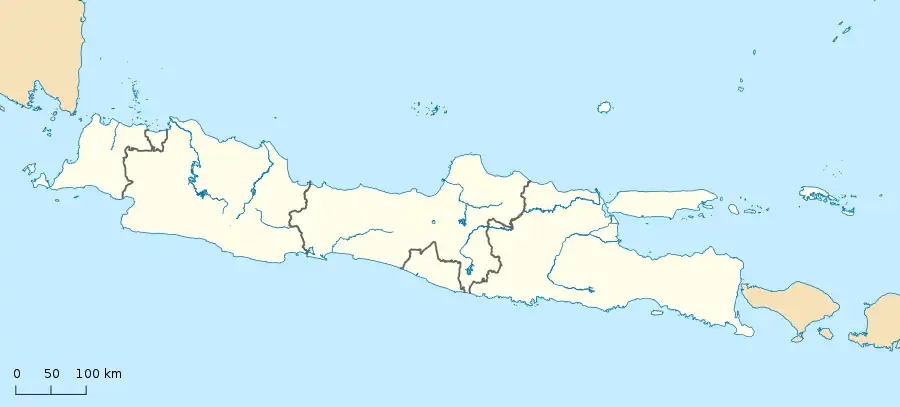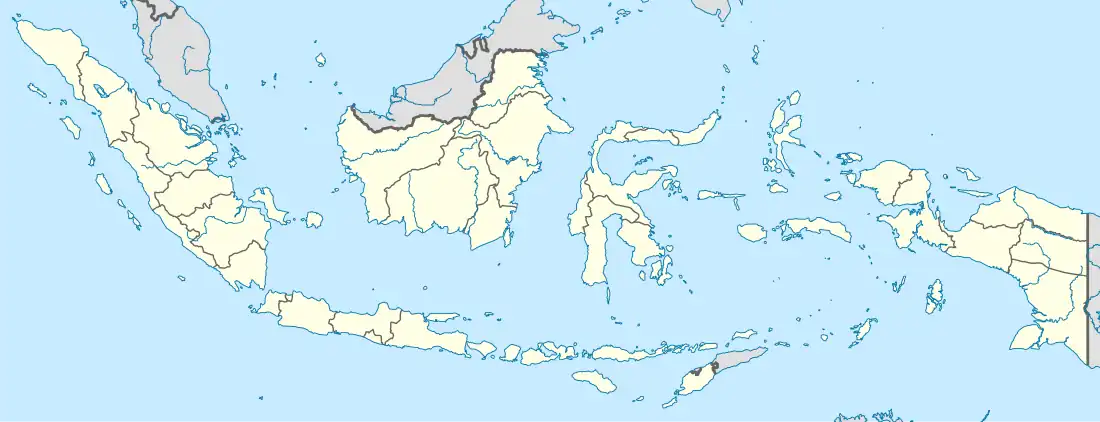Tegal | |
|---|---|
| Other transcription(s) | |
| • Hanacaraka | ꦡꦼꦒꦭ꧀ |
| • Pegon | تٓڮال |
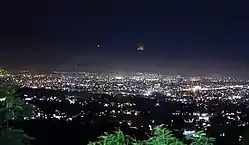 View of Tegal at night 2018 | |
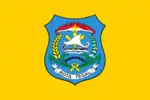 Flag 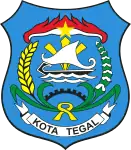 Coat of arms | |
| Nickname: Kota Bahari (lit. 'Maritime City') | |
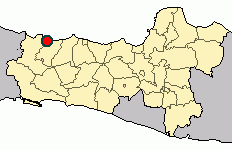 Location within Central Java | |
| Coordinates: 06°52′03″S 109°08′15″E / 6.86750°S 109.13750°E | |
| Country | Indonesia |
| Province | Central Java |
| Government | |
| • Mayor | Dedy Yon Supriyono |
| • Vice Mayor | Muhamad Jumadi |
| Area | |
| • City | 39.24 km2 (15.15 sq mi) |
| • Metro | 564 km2 (218 sq mi) |
| Population (mid 2022 estimate) | |
| • City | 290,988 |
| • Density | 7,400/km2 (19,000/sq mi) |
| • Metro | 1,366,858 |
| • Metro density | 2,400/km2 (6,300/sq mi) |
| Time zone | UTC+7 (Indonesia Western Time) |
| Area code | (+62) 283 |
| Website | tegalkota.go.id |
Tegal is a city in the northwest part of Central Java of Indonesia. It is situated on the north coast (or pesisir) of the province of Central Java, about 175 km (109 mi) from Semarang, the capital of the province. It had a population of 239,599 at the 2010 Census[1] and 273,825 at the 2020 Census;[2] the official estimate as of mid-2022 was 290,988 (comprising 146,735 males and 144,253 females).[3] Its built-up (or metro) area made up of Tegal Municipality and 12 districts spread over Tegal and Brebes Regencies was home to 1,366,858 inhabitants as of the 2010 census.[4] It is administratively separate from Tegal Regency, which borders it to the south and east; Brebes Regency borders it to the west.
The Dutch East Indies colonial sugar industry originated in Tegal and the nearby city of Pekalongan, approximately 50 km (31 mi) to the east. Tegal Regency remained a major sugar production center until the mid-20th century.[5] The city served as a port for exporting sugar produced on the nearby plantations. Tegal is famous for its warung, commonly called "warteg" or warung tegal. It is also known for its tea products, such as teh botol Sosro, Tong Tji tea, 2 Tang tea, Gopek tea, and other brands.
History


The city of Tegal developed from a small village called Tetegual. The modernization of the village began in the early 1530s, and it eventually became part of the Pekalongan Regency, which admitted the existence of the Pajang Empire in Central Java. The Pajang Empire was the successor of the Sultanate of Demak.
The city was founded by Ki Gede Sebayu. Together with the local people, he aspired to increase the region's agriculture, exploiting its fertile soil. Because of his efforts to develop the region, he became the high leader and the symbol of the city. His coronation as leader was held simultaneously with a traditional festival celebrating a rich agricultural harvest. By district ordinance no. 5/1988, July 28 is the anniversary of the city of Tegal.
In the 1920s, the city was a center of activism for the Communist Party of Indonesia (PKI), and the radical leaders of the Tegal branch of the PKI were among the instigators of the 1926 rebellion that led to the temporary destruction of that party.[6]
On 8 October 1945, an anti-feudalism movement called Gerakan Tiga Daerah ("Three Regions Movement") was established in Tegal, Pekalongan, and Brebes. Its goal was to replace the blue-blood regents (related to the kings of Yogyakarta and Surakarta) with ordinary people. According to the leaders of this movement, the old regents cooperated with the Japanese during World War II and sent people to Japanese slave labor camps. The main leader of Gerakan Tiga Daerah was Sarjiyo, who became the new regent of Pekalongan. Others were Kutil, K. Mijaya and Ir. Sakirman. Ir Sakirman was the local leader of the PKI. The government of the Republic of Indonesia in Yogyakarta opposed Gerakan Tiga Daerah and declared it illegal.
Gerakan Tiga Daerah had the old regents arrested, stripped naked, and dragged into prison. Other government officials and police officers were kidnapped and massacred at Talang Bridge. The Gerakan Tiga Daerah also provoked a racial riot against ethnic Chinese in Brebes. On 4 November 1945, the movement attacked the Indonesian army headquarters and the regent office in Pekalongan. The rebels were defeated by the Indonesian army in a fierce battle on 21 December 1945, and most of their leaders were arrested and imprisoned. This rebellion is called the Three Regions Affair.
During the unrest following the resignation of President Suharto in 1998, Tegal was the site of extensive protests and occasional violence against local government officials, especially in June 1998.
Tegal has faced issues relating to political corruption. In the late 2010s, two consecutive mayors of the city - Ikmal Jaya and Siti Masitha Soeparno - were both arrested by the Corruption Eradication Commission and convicted.[7]
Administrative division
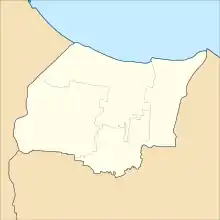
Tegal Town Hall as the administrative center of Tegal City originally occupied the Resident Building on Jl. The young man who is now used for the Parliament Building Tegal City. But since 1985, the center of government moved to Pendopo Ki Gede Sebayu former Pendopo Tegal regency, in the area of Alun-alun Mangkukusuman. Colonel Laut (Ret.) Adi Winarso, S. Sos is Tegal's first son who served as mayor for two periods, 1999 - 2004 and 2004 - 2009 through an indirect election. The year 2008 marks a new history of the leadership of Tegal City, because in that year also for the first time, a mayor and deputy mayor were directly elected by the people of Tegal City. As a result, Ikmal Jaya, SE Ak, and Ali Zainal Abidin, SE won the election. They were inaugurated on March 23, 2009, by the Governor of Central Java, Bibit Waluyo. Tegal City is divided into 4 districts (kecamatan) and sub-divided into 27 administrative villages (kelurahan). The districts are listed below with their areas and their populations in 2010[1] and 2020[2] Censuses, together with the official estimates as at mid-2022:[3]
| Kode Wilayah |
Name of District (kecamatan) |
Area in km2 |
Pop'n Census 2010 |
Pop'n Census 2020 |
Pop'n Estimate mid 2022 |
No of kelurahan |
|---|---|---|---|---|---|---|
| 33.76.03 | Tegal Selatan (South Tegal) | 6.37 | 57,592 | 67,207 | 70,508 | 8 |
| 33.76.02 | Tegal Timur (East Tegal) | 7.26 | 74,106 | 80,707 | 85,964 | 5 |
| 33.76.01 | Tegal Barat (West Tegal) | 12.32 | 62,464 | 66,924 | 70,127 | 7 |
| 33.76.04 | Margadana | 13.29 | 45,437 | 58,987 | 61,546 | 7 |
The names of the component villages (kelurahan) and their postcodes are as follows:
| Districts | Kelurahan | Postal codes | Districts | Kelurahan | Postal codes |
|---|---|---|---|---|---|
| Margadana | Sumurpanggang | 52141 | South Tegal | Randugunting | 52131 |
| Margadana | 52143 | Central Debong | 52132 | ||
| Krandon | 52144 | Debong Kulon | 52133 | ||
| Kalinyamat Kulon | 52146 | Keturen | 52134 | ||
| Cabawan | 52147 | Tunon | 52135 | ||
| Kaligangsa | Kalinyamat Wetan | 52136 | |||
| Pesurungan Lor | Bandung | 52137 | |||
| West Tegal | Tegalsari | 52111 | Debong Kidul | 52138 | |
| Kraton | 52112 | East Tegal | Mintaragen | 52121 | |
| Kemandungan | 52114 | Panggung | 52122 | ||
| Debong Lor | 52115 | Mangkukusuman | 52123 | ||
| Muarareja | 52117 | Kejambon | 52124 | ||
| Pesurungan Kidul | Slerok | 52125 | |||
| Pekauman | 52113 |
Geography
Tegal City is located on the north coast road (pantura) of Central Java, located 165 km west of Semarang City or 329 km east of Jakarta, and lies between 109 ° 08 '- 109 ° 10' East Longitude and 6 ° 50 '- 6 ° 53' South latitude, with an area of 39.68 km2 or approximately 3,968 hectares. Tegal City is located in the Pantura region, from the orientation map of Central Java Province located in the Western Region, with the farthest spans north to south 6.7 km and west to east 9.7 km. Seen from a geographical location, Tegal's position is very strategic as a liaison of cross-national and regional economic paths in Pantura region that is from west to east (Jakarta-Tegal-Semarang-Surabaya) with middle and south area Pulai Jawaa (Jakarta-Tegal-Purwokerto-Yogyakarta- Surabaya) and vice versa.
Climate
Tegal has a tropical monsoon climate (Am) with moderate to little rainfall from June to October and heavy to very heavy rainfall from November to May.
| Climate data for Tegal | |||||||||||||
|---|---|---|---|---|---|---|---|---|---|---|---|---|---|
| Month | Jan | Feb | Mar | Apr | May | Jun | Jul | Aug | Sep | Oct | Nov | Dec | Year |
| Mean daily maximum °C (°F) | 30.5 (86.9) |
30.6 (87.1) |
31.5 (88.7) |
31.9 (89.4) |
32.1 (89.8) |
31.9 (89.4) |
31.8 (89.2) |
32.0 (89.6) |
32.6 (90.7) |
33.0 (91.4) |
32.6 (90.7) |
31.8 (89.2) |
31.9 (89.3) |
| Daily mean °C (°F) | 27.1 (80.8) |
27.1 (80.8) |
27.7 (81.9) |
27.9 (82.2) |
27.9 (82.2) |
27.4 (81.3) |
27.2 (81.0) |
27.1 (80.8) |
27.6 (81.7) |
28.1 (82.6) |
28.2 (82.8) |
27.8 (82.0) |
27.6 (81.7) |
| Mean daily minimum °C (°F) | 23.7 (74.7) |
23.6 (74.5) |
23.9 (75.0) |
23.9 (75.0) |
23.8 (74.8) |
23.0 (73.4) |
22.6 (72.7) |
22.2 (72.0) |
22.6 (72.7) |
23.3 (73.9) |
23.8 (74.8) |
23.8 (74.8) |
23.3 (74.0) |
| Average rainfall mm (inches) | 372 (14.6) |
322 (12.7) |
241 (9.5) |
130 (5.1) |
127 (5.0) |
83 (3.3) |
61 (2.4) |
44 (1.7) |
36 (1.4) |
58 (2.3) |
134 (5.3) |
265 (10.4) |
1,873 (73.7) |
| Source: Climate-Data.org[8] | |||||||||||||
Economy
Trade and services are the main sectors of the economy of Tegal City. The city became the final processing and marketing of various products from the western part of Central Java. Small and medium enterprises are quite rapid progress is the home metal industry in the area of Jl. Cempaka, and Tegalan batik handicrafts in Kalinyamat Village. To support the economic pulse, the city government of Tegal has built the Center for Promotion and Business Information (PPIB).
Language
Tegal[9] has its language, known as Bahasa Tegal. Tegal language has a resemblance to the language of Banyumas ( ngapak ) that is in the vocabulary. However, people in Tegal are reluctant to use ngapak as a term of the language, due to their dialectical difference. People using the Tegal language include the northern part of the Tegal regency, Tegal City, the western part of the Pemalang regency, and the eastern part of the Brebes district. The first Tegal language Congress was held by the Tegal City government on April 4, 2006, at the Bahari Inn hotel. The event which was initiated by Yono Daryono presented several figures such as SN Ratmana (cerpenis), Ki Enthus Susmono (dalang Tegal), Eko Tunas (Tegal poet), Dwi Ery Santoso (Poetry and Director). The purpose of the congress was to raise the status of the Tegalan dialect into the Tegal language. Some Indonesian comedians speak it because its accent and dialect arouse amusement. One example is the translation of the greeting phrase "How are you?" into "Kepriben kabare?".
Greetings
It is common practice for people in Tegal to call their friends "Jon", "Jack" or "Jakwir". The translation for "Daddy" is Jasak, "Mommy" is Jok, a younger brother is addressed as Yarig, and an older brother is Sahang. Many other words can only be understood by native Tegals. Bahasa Tegal also has many Arabic loan words.
Interesting places and buildings
- Gunung Guci: natural sulfur waterfalls for healing many skin diseases;
- Pantai Alam Indah (PAI): a famous beach in Tegal;
- Alun-alun Tegal: in front of Mesjid Agung Tegal mosque;
- Pasar Pagi Tegal: the biggest market in Tegal;
- Bird Market: in Pasar Senggol next to the Alun-alun area;
- Taman Poci: a small park with a children's playground and picnic area in front of the station, with kiosks selling exotic foods and Teh Poci tea;
Historical buildings in the city of Tegal are mostly Dutch architecture,
- Tegal railway station: connecting many other big cities in Java.
- The Dance Building (Lanal Tegal) was established in 1914.
- Stoomtram Maatschappij Semarang-Cheribon Building was established in 1913, this building was once used as a campus of Pancasakti University Tegal.
- Parliament Building (Jl. Pemuda)
- City Hall and the mayor's office (Ki Gede Sebayu No.12, Komplek Alun-alun Mangkukusuman)
- Post Office (Jl Proklamasi No.01)
- Navy Headquarters (Jl Proklamasi)
- Water Tower (Pancasila Street)
- Birao Building SCS (Jl Pancasila)
- Gedung Pancasakti University
- The Sacred Heart of Jesus Parish Catholic Church
- Temple Tek Hay Kiong (Gurami Street)
Notable people
- Ahmad Muzani (b. 1968), politician
- Ikmal Jaya (b. 1973), businessman, mayor between 2009 and 2014
- Nursholeh (1957–2020), mayor between 2017 and 2019
- Suswono (b. 1959), politician
- Joseph Theodorus Suwatan (b. 1940), bishop of Manado
- Simon Santoso (b. 1985), badminton player
- Imam Tantowi (b. 1946), film director and screenwriter
- Pah Wongso (1904–1975), Chinese Indonesian social worker
- Willem Thomas de Vogel (1863–1955), colonial physician and official
References
- 1 2 Biro Pusat Statistik, Jakarta, 2011.
- 1 2 Badan Pusat Statistik, Jakarta, 2021.
- 1 2 Badan Pusat Statistik, Jakarta, 2023, Kota Tegal Dalam Angka 2023 (Katalog-BPS 1102001.3376)
- ↑ "Indonesia: Provinces, Regencies, Cities, Districts, Communes, Settlements - Population Statistics in Maps and Charts". www.citypopulation.de. Archived from the original on 2022-11-06. Retrieved 2022-11-06.
- ↑ Knight, G.R. (1993) Colonial Production in Provincial Java. The Sugar Industry in Pekalongan-Tegal, 1800-1942. Amsterdam: VU University Press.
- ↑ McVey, Ruth. (1965) The rise of Indonesian communism. Ithaca, NY: Cornell University Press. pp 329-340.
- ↑ KPK arrests Tegal mayor Siti Masitha Archived 2021-01-13 at the Wayback Machine. Jakarta Post, 29 August 2017. Accessed 28 February 2018.
- ↑ "Climate: Tegal". Climate-Data.org. Archived from the original on 24 July 2023. Retrieved 12 November 2020.
- ↑ "tegal.us - Registered at Namecheap.com". www.tegal.us. Archived from the original on 2018-09-05. Retrieved 2017-11-24.
External links
- (in Indonesian) Military History Centre/Three regions affair
- (in Indonesian) Military History Centre/Battle on December 21, 1945
